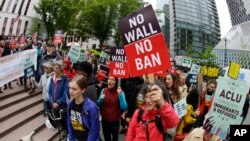A second U.S. federal court has voted to uphold a block on President Donald Trump's executive order restricting travel from six mostly Muslim countries.
The 9th Circuit Court of Appeals in San Francisco ruled unanimously Monday against Trump's temporary ban, on the grounds that the president overstepped his authority when he issued his March 2 executive order, "Protecting the Nation from Foreign Terrorist Entry in the United States."
The three-judge panel said that while the 1952 Immigration and Nationality Act gives the president broad powers to both control entrants to the U.S. and protect U.S. security, "immigration, even for the president, is not a one-person show."
Monday's decision echoes a previous ruling by the Virginia-based 4th U.S. Circuit Court of Appeals, which on May 25 upheld a Maryland judge's ruling blocking parts of the order. But the two courts made very different arguments.
The 4th Circuit focused largely on statements and tweets made by President Trump that indicated his order was a ban on Muslims, something he advocated during his campaign for president. But the 4th Circuit was only ruling on the portion of the law restricting travel from the six countries for 90 days. The 9th Circuit ruled more broadly and focused on the INA and what the judges saw as insufficient justification to support the travel order.
"In suspending the entry of more than 180 million nationals from six countries, suspending the entry of all refugees, and reducing the cap on the admission of refugees from 110,000 to 50,000 for the 2017 fiscal year, the president did not meet the essential precondition to exercising his delegated authority: The president must make a sufficient finding that the entry of these classes of people would be “detrimental to the interests of the United States,” the judges wrote.
Attorney General Jeff Sessions said the Trump administration disagrees with the 9th Circuit's decision and "will continue to seek further review by the Supreme Court."
"Recent attacks confirm that the threat to our nation is immediate and real. Certain countries shelter or sponsor terrorist groups like ISIS and al-Qaida, and we may be unable to obtain any reliable background information on individuals from these war-torn, failed states," Sessions said in a statement.
Security
The INA gives the president authority to restrict the entry of foreign nationals when they would be "detrimental to the interests of the United States," the judges wrote. But they went on to say that there is no demonstration in the travel order that admitting travelers from Somalia, Sudan, Iran, Yemen, Syria and Libya would be detrimental to U.S. national security
"The order does not tie these nationals in any way to terrorist organizations within the six designated countries. It does not identify these nationals as contributors to active conflict or as those responsible for insecure country conditions. It does not provide any link between an individual’s nationality and their propensity to commit terrorism or their inherent dangerousness."
The judges said the travel order does not really curtail travel on the part of individuals, but rather on countries that it says are inherently dangerous. In this, they did cite one of the president's tweets: “That’s right, we need a TRAVEL BAN for certain DANGEROUS countries, not some politically correct term that won’t help us protect our people!”
Refugees
Similarly, the judges found no adequate explanation for the restriction of refugee admissions to 50,000 for the 2017 fiscal year. Noting that the administration of former President Barack Obama had established a level of 110,000 and justified it on humanitarian grounds, the judges said the order "gives no explanation for why the 50,001st to the 110,000th refugee would be harmful to the national interest, nor does it specify any further threat to national security."
"We do not anticipate any change to the current status of refugee admissions processing as a result of the 9th Circuit ruling," a State Department spokesperson told VOA Monday.
The State Department, which oversees in part the early stages of refugee admission to the U.S., said last week that it would be processing refugee applications under the original cap for the fiscal year, rather than under the significantly reduced number set by Trump's executive order. The announcement followed congressional approval of a federal budget in May for the remaining months of the fiscal year. It also came after the 4th Circuit upheld an injunction on part of the president's travel related executive order.
Just over 47,000 refugees have resettled in the United States since October, at a greatly reduced pace since the first travel ban was signed January 27. In recent weeks, that number has been about 800-900 refugees a week. The State Department said it could not speculate about the final number of refugees that would ultimately come to the U.S. by the end of September; at the current rate, that would mean about 60,700 refugees overall for the year.
“In upholding the lower court’s decision to stop President Trump’s travel and refugee ban from going into effect, we are staying true to our American values," wrote Lutheran Immigration and Refugee Service, one of the largest U.S. refugee agencies. "As a country, we must remain compassionate, welcoming and accepting toward those who are fleeing war, violence and persecution."
The Trump administration has appealed the 4th Circuit ruling to the Supreme Court, asking for immediate relief from restraining orders issued on both coasts. Also on Monday, the American Civil Liberties Union filed a brief with the Supreme Court pointing out that very soon the 90-day ban on travel will expire and "the appeal will be moot, in a matter of days. There is no reason for this court to grant review.”
The travel order that was the subject of Monday's ruling is a second attempt by the Trump administration. The first was withdrawn after it, too, was stayed by a district court. That stay also was upheld by the 9th Circuit.






